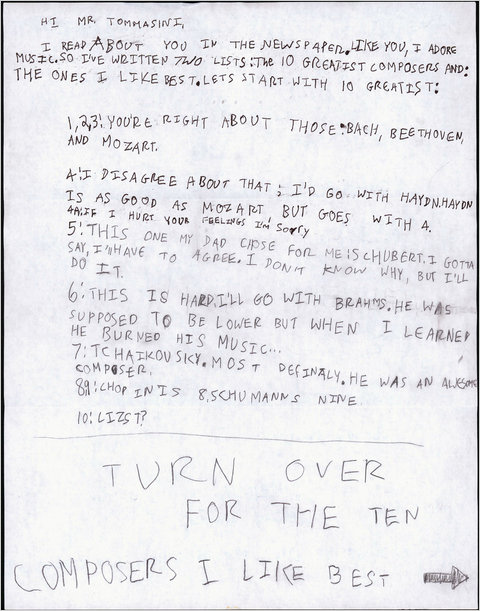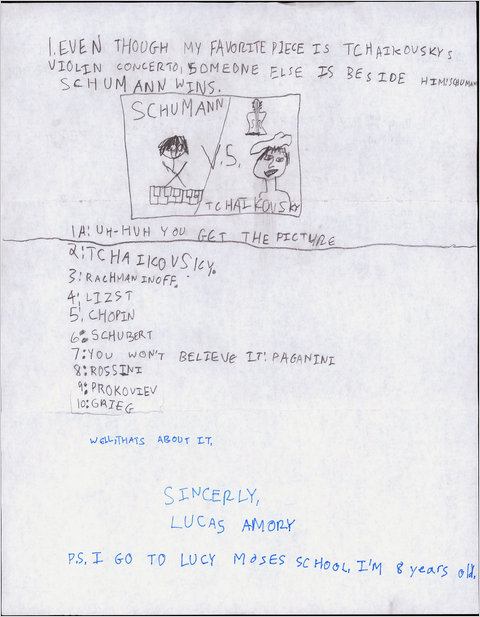I’m not normally a fan of Top Ten lists of any variety (though I sometimes consider making Top Ten lists of critics I don’t want making Top Ten lists), but I have to stand behind Anthony Tommasini’s 2-week Top 10 Composers list for the response it generated. No, not the OUTRAGE on the interwebz–no women! no one alive! no one not-white!–or the nearly 2,000 comments on the Times’ website, but for this letter from an 8-year-old who we will refer to as Lucas The Awesome.
From Anthony Tommasini:
My two-week project to select the 10 greatest composers, which involved a series of articles, blog posts and videos, concluded with an article in the Arts & Leisure
section on Jan. 23. But I continue to receive lively, interesting
reactions from readers. My favorite was a hand-written letter from
Lucas Amory, who is 8 years old and lives on the Upper West Side of
Manhattan. Lucas is a serious piano student and the son of two noted
violists, Misha Amory of the Brentano String Quartet and Hsin-Yun Huang.Lucas attends the Special Music School at the Kaufmann Center (in
his letter he says that he goes to the Lucy Moses School, which
occupies the same building). He writes that he adores music and offers
two lists: “THE TEN GREATEST COMPOSERS AND: THE ONES I LIKE BEST.” He
clearly understands the difference between all-time greats and personal
favorites — quite impressive for an 8-year-old.
From Lucas Amory:


I also especially like point 5 (“This one my dad chose for me: Schubert. I gotta say I have to agree. I don’t know why, but I’ll do it.”), because it so perfectly exemplifies the unexplainable musical biases in all of us, critics included.
And speaking of biases, I’d like to draw your attention, if I may, to a project I’m working on with many great colleagues. It’s a festival at Carnegie this spring called Spring for Music (a la Fall for Dance), and its intention is to encourage adventurous (oh, that word…) programming by North American orchestras. All tickets are $25, but the most important matter at hand is a Fantasy Program contest that ends at midnight EST tonight. Let’s call it “So You Think You Can Program,” and it’s for all the haters (present blogger included) who think they can do a better job programming than most orchestras. The winner of the contest will get to present their program (recordings, of course) on a national Performance Today broadcast.
I think everyone who has submitted a program is a man. Groan, right? There was a flurry of Twitter activity over the hashtag #DWG (Dead White Guys) recently. I’m going to take it to Twitter and see if we can get some #AWW (Alive White Women) #WASP (Who Aren’t Submitting Programs) activity going.
I would also like to invite Lucas to submit a program, even if it is of works by his two favorite , competing #DWG’s.

‘The winner of the contest will get to present their program (recordings, of course) on a national Performance Today broadcast’
So that rules out my Fantasy Program then! I never understand why orchestras waste valuable concert time performing music that is already available in countless (sometimes incomparable) recorded performances that music-lovers can perfectly well listen to any time at home. My Fantasy Program — nay, Fantasy Concert Series, or even Fantasy Orchestral Policy – would be for just one orchestra to exist that never performed anything live that you could already hear on a recording (and of course we’re talking old music as well as new), or at the very least included at least one previously un-recorded work in every program as a matter of policy. Who knows, if cleverly marketed (‘the music you can only hear here’), it might even help restore some purpose and excitement to the moribund live music scene?
I thought it was interesting that Mr. Tommasini’s list began as a list of “the world’s greatest composers,” and is now referred to by him as “the world’s greatest classical composers,” and is in fact a list of the world’s greatest Romantic-era composers.
A list of the world’s greatest composers which only refers to 19th-century Romantics is in my view hardly a list worth taking seriously. Especially one in which Mr. Tommasini makes the monumentally stupid remark that Haydn “more or less invented classicism.” I hope that young Lucas eventually finds out that the history of Western music covers about a thousand years, each century of which has produced many towering masterpieces, all of which deal with Classical themes in one way or another. In short, I hope he manages to widen his scope of music appreciation way beyond that displayed by Mr Tommasini, and those others who only know little beyond the 100-year focus on 19th century music.